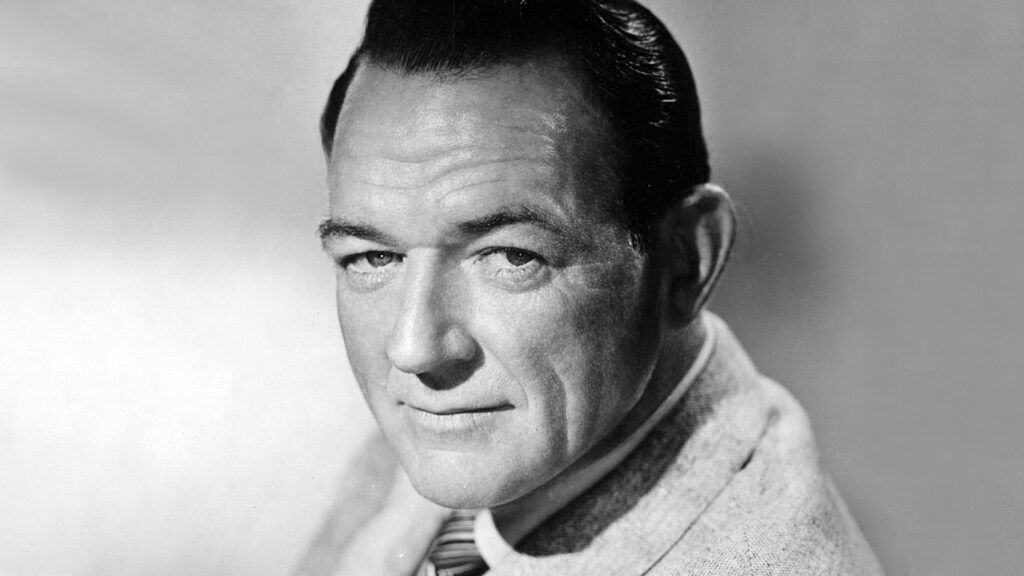There’s a question that, sooner or later, all of us seem to ask. When things go against us, when trouble comes or sickness or heartache, our hands go out in a gesture of bewilderment and we ask:
“Why me?”
Or perhaps you’ve heard it as “What have I done to deserve this?” Or “Why pick on me?”
“Two years ago it was my turn to complain to God in just those words —“Why me?”—and yet I could phrase them only in my mind. I lay m a Los Angeles hospital unable to talk. The only way I could communicate words was to write them. My larynx—or voice box—had been removed and I lay there deep, deep in depression.
Here I was, an actor who could not speak. It was like being an athlete who could not run or a painter who could not see. For 35 years I’d been in the entertainment world, in movies, radio, stage, TV. Suddenly it all was over.
Yet, I was told I had reason to be cheerful.
“You’re in good luck, Bill,” the surgeon had said. “Cancer of the larynx is one of the most curable of all cancers. If discovered in time, we can save 90 per cent of our patients.” He smiled. “We got you in time.”
It had been an odd quirk, finding that cancer in me. I had been playing in San Francisco in a drama about politics called The Best Man. Prophetically, I had the part of a president who was a cancer victim.
We were supposed to go on to Chicago, but the play was doing so well that the management decided to keep it in San Francisco for an additional two weeks. God works in wondrous ways. That decision saved my life. By waiting, we lost the theater in Chicago, and the show closed.
Back in Los Angeles, my wife, Mary, got after me. “You have the time now to get that throat of yours looked at,” she said, forcing me to a doctor’s office. For weeks I’d had a sore throat and couldn’t shake it.
The doctor told Mary, not me, about the possibility of a malignancy, and for three days she carried that fear around in her heart. Then, just before I went to hear about the results of some medical tests, Mary tried to ease me into possible bad news. Even so, I was shocked when the verdict came. I had to make a choice, the doctor said. Operate and live; don’t operate and die.
“When do you operate?” I asked angrily. I was so hurt by the news that I was mad.
“In a week or ten days,” he replied. “You’ll need time to put your affairs in order and …”
“I need 24 hours,” I said forcefully. “If you can’t take me then, I’m going down the street.”
We settled on 36 hours.
It is true that when you know that death is near, life becomes intense and you live rapidly and deeply. And you learn things, too, which in all the years before you have not learned. I learned in the confusion of that day and a half that I was unafraid of death.
I didn’t have far to go to talk to God in those 36 hours; He was no stranger. I talked to Him with the same prayer I have used each day for as long as I can remember:
Look down upon me, good and gentle Jesus, whilst before Thy face I humbly kneel, and with burning soul, pray and beseech Thee to fix deep in my heart, live sentiments of faith, hope and charity.
By the time I went into the operating room, I was calm and confident. I remember the last words I spoke. They were for Mary. I looked up at her. “I love you,” I said.
And so the operation was a success, and there I lay in the hospital, totally depressed. I had not feared dying, but now I was afraid to live. Only a few days before my religion had been my strength but now, in self-pity, I began to weaken.
“Why me, God?” I asked with lips that brought forth no sound. “Is this some penance You’re exacting for something I’ve done wrong?”
Every day, many times a day, I continued to say my prayers, but in the gloom I suffered from the injustice I felt had been done me.
In a few weeks the doctor announced, “You’re snapping back so fast, I’m going to make arrangements for your speech lessons.”
I took out my pad and pencil. “Are you nuts?” I wrote.
“Esophageal speech,” he said and went out.
“Never heard of it,” I wrote on my pad, anyway.
So there I was propped up in bed looking like a chipmunk—my face was still puffed up from the operation—when a lady named Teckla Tibbs came in.
“I’ve come to let you hear what esophageal speech sounds like,” she said in a hoarse, mechanical-sounding voice. I must have stared at her somewhat peculiarly. “You won’t talk any better than I do, Bill, but at least,” she said gruffly, “you’ll talk like a member of your own sex!” Her eyes twinkled and for the first time in weeks I felt like laughing.
Teckla Tibbs went on to explain the basic facts of being a laryngectomee. She wore a large flat gold necklace around the lower part of her neck which covered the stoma or hole a surgeon had created in order to join the trachea to it. Since there was no longer any connection between the mouth or nose and the lungs, she breathed, coughed and sneezed through that opening.
“To a large degree I’ve lost my sense of taste and smell, as you probably have,” she told me, “but I can do almost anything I could do before—except swim.”
It was the talking I wanted to learn about. She gave me some literature and after reading it, I began to feel the wonderful warmth of hope kindling inside me.
As soon as I was able to go home, the American Cancer Society telephoned, asking when I could come for my first speech lesson. I went immediately.
It was a grueling half hour in which I struggled in vain to make even the tiniest sound. Esophageal speech is a complicated process of developing false muscles, of forcing air into the esophagus so that its walls vibrate and cause a low-pitched sound. I’d take a sip of water and try to get the air down with it. I’d get the water down and eventually the air with it, but I couldn’t produce the sound I was supposed to be able to make.
At home I practiced desperately. Day after day, Mary worked with me. “If you ask him a question and he doesn’t try to speak, turn your back on him,” the doctors told her. Later, Mary said that was the hardest thing of all for her to do.
It got so that my friends would come in and work with me. Pat O’Brien, Jack Haley, Charlie Ruggles, Dennis Day, Ed Delaney—those guys spent hours trying to force a sound out of me. My old pal, Irving Pinsky of Queens, would call me long distance and demand that I talk to him.
In time, sounds came. First a gasp and a burp and then an “ah” and then an “ee,” and then gradually I began to manipulate these “ahs” and “ees” and “ohs” into words.
Sixteen lessons later I graduated from speech class with a new voice. My teachers approved, but they urged me never to sing a song unless I wanted to empty a theater. Their joke suggested a problem which I had all but forgotten. I had a new voice, but it was not an actor’s voice. How was I to spend my time?
Once again the American Cancer Society was on the phone. Would I make a speech on their behalf? This time it wasn’t necessary to scribble out the question “Are you nuts?” I didn’t ask it, either, but I wanted to. Still, I thought, nobody has misled me yet. They must know what they are doing.
“Sure,” I agreed.
Once again I felt the excitement of stage fright. Some 20 people were there at a luncheon in Palm Springs when I was introduced. I was worried, not knowing if my voice would work or if I could be heard.
“Unaccustomed as I am to public speaking,” I began. There was a laugh and I relaxed. I was home free.
After that the ACS asked if I would help in their fund-raising campaign. That year we managed to triple the quota in Palm Springs. Then I started speaking before “Lost Chord” clubs and other groups of laryngectomees the country over. There are approximately 20,000 of us in the United States today (about ten men to every one woman) and the clubs help new members over those first difficult months.
To sport my stuff again, to show off my special skill before newcomers and give them hope, was more thrilling to me than any play I’d ever been in.
Today I roam all over the country volunteering my services as a speaker. When I tell people that a checkup once a year and a close watch for the seven danger signals could cut cancer deaths by 50 per cent, they’re more inclined to follow my simple advice because of my raspy voice.
In this simple way, I am doing something to help others. I believe that God forever is creating such opportunities for us, but often we are too involved in ourselves to grasp them. That’s why the next time I’m inclined to complain with a petulant “Why me?”—I’ll change that quickly to:
“Why not me, God?”
For more inspiring stories, subscribe to Guideposts magazine.






